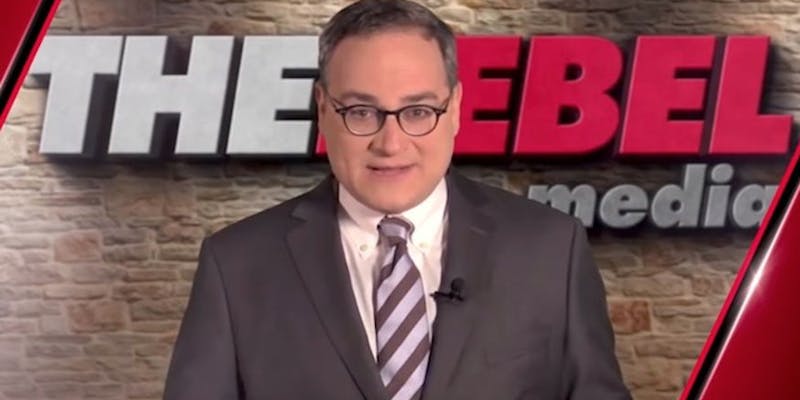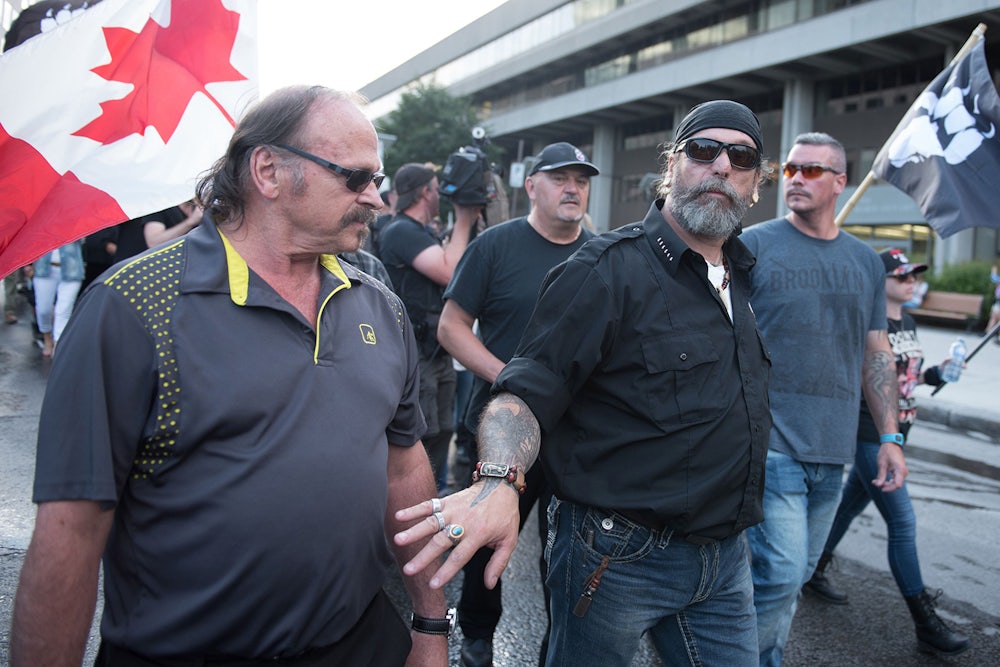If Faith Goldy had been any other journalist, she would have had the scoop of a lifetime on August 12 in Charlottesville, Virginia. A correspondent for Canadian website The Rebel, she was broadcasting live from a white-supremacist rally when she captured the startling scene of a car, later discovered to have been driven by a white nationalist, mowing down protesters. But the value of Goldy’s reporting was overshadowed by the fact that she had come to Charlottesville with a hard-driving agenda of her own. Weaving through the crowd with her phone-camera rolling and a bright pink gas mask dangling from her neck, she had spent the entire day fawning over neo-Nazis.
She spoke glowingly of “white racial consciousness.” She heaped praise on a manifesto written by white nationalist Richard Spencer, describing it as “Martin Luther’s thesises [sic] meets the French Revolution’s Tennis Court Oath.” And she sneered and snickered at counter-protesters affiliated with Black Lives Matter, suggesting they were drugged (“Smells like weed”) and violent (“These houses here would be smashed right now if this was a BLM protest”).
To top it all off, after watching counter-protester Heather Heyer die under the wheels of a Dodge Challenger, Goldy turned around and appeared on a podcast linked to the “world’s most genocidal” website, The Daily Stormer.
Goldy’s antics—all the more shocking in light of the non-apology she issued a few days later—have created a crisis at her employer, The Rebel. Founded just two years ago by Ezra Levant, an enterprising pundit with longstanding ties to mainstream Canadian conservatism, The Rebel is often described as Canada’s Breitbart. In some ways, the analogy is apt: Like Breitbart, The Rebel has emerged as a powerful voice for xenophobia and for ethnic nationalism framed as a populist revolt against globalist elites. Both Breitbart and The Rebel are clearing houses for conspiracy theories about creeping Sharia. And both have some measure of political clout. Where Breitbart had Steve Bannon calling shots at the White House, The Rebel had Hamish Marshall, campaign manager for Conservative Party leader Andrew Scheer, sitting on its board.

But for all their similarities, the two media empires are now at a crossroads. In the wake of Charlottesville, The Rebel is in full meltdown mode. Scheer and other conservative politicians have distanced themselves from the website, saying they won’t be interviewed by its reporters again until there is a change in editorial direction. Hamish Marshall has removed himself from the board. The co-founder of The Rebel and several of its leading columnists and video personalities have quit. Ex-employees have surfaced with accusations of financial impropriety, claiming that Levant was soliciting donations from supporters that weren’t necessary. Levant, in turn, has responded by accusing those former employees of trying to blackmail him. To top it all off, on Monday The Rebel’s domain provider yanked its internet registration, leaving the site temporarily unavailable in “half the world,” according to Levant.
Oh, and Faith Goldy got fired. Joking that her boss—who is Jewish—loves “free bacon” while appearing on a neo-Nazi podcast probably didn’t help.
Americans watching the implosion of The Rebel might be asking themselves a hopeful question: Could it happen here? Could Breitbart itself collapse as quickly as its Canadian counterpart? They’ll have to keep hoping. The paths of the two websites have diverged after Charlottesville, pointing to fundamental differences between the far right in Canada and the far right in the United States. One is shunned; the other is thriving.
The key to understanding The Rebel is that while Ezra Levant, a gesticulating and manic figure who likes to style himself as the Rebel Commander, might seem like a sinister goofball, he is ultimately embedded in mainstream Canadian conservatism, a cozy and confining milieu that limits Levant’s attempts to push the nation’s politics to the right. From his university days to his work as a pundit and political adviser, Levant has been been noted for his stridency, but he’s always been carrying out the agenda of elite conservative figures, such as trying to unite various fractured right-wing parties or defending the oil sands of Alberta from environmental critique. “Ezra has been, at one time or another, connected to almost everybody on the right side of politics in Canada,” argued University of Calgary political scientist Tom Flanagan, one of Levant’s mentors and himself a pillar of the Canadian right.
At the same time, throughout his career, Levant has worked to mimic the vitriolic media outlets so familiar to the American right. He created a magazine called The Western Standard, which tried to be the Canadian Weekly Standard. Later, he was a prominent personality on Sun News Network, which tried to be the Canadian Fox News. Both ventures failed dismally.
Now he is staring down failure again, which can hardly come as a surprise. As Jonathan Kay, an erstwhile journalistic colleague of Levant, notes in The Walrus:
The Rebel . . . had to operate as an isolated enclave of red-meat conservatism in a country where even the “Conservative” party stands for universal health care, official multiculturalism, and the welfare state.
By contrast, right-wing media companies in the United States grow in a much richer soil, benefiting from
a densely populated conservative ecosystem of pundits, fundraisers, scholars, think tanks, activists, lobbyists, and GOP politicians and functionaries—almost all of them reading from the same core catechism on abortion (evil), taxes (bad), Islam (dangerous), gun rights (sacred), and anthropogenic global warming (fictitious).
The money is particularly important. Canada, a country much less populous than the United States and significantly more egalitarian, doesn’t have an extensive network of plutocrats who are willing to cut endless large checks to fund right-wing media and political activism. There are few Canadian counterparts to Rupert Murdoch, the Koch Brothers, the Mercers, and other such American billionaires.
It’s not exactly clear how The Rebel funds itself, but reporting from Vice and the Press Progress indicates that the website does have “wealthy benefactors.” At least one of those sugar daddies is an American: the tech billionaire Robert Shillman, who has a history of funding Islamophobic journalism. That The Rebel has been getting in on the right-wing American gravy train may hint at what we can expect from it next.
In its two years of publishing, The Rebel developed a sort of hybrid identity: it was based in Canada, but it promoted and benefited from an alt-right ideology that was flourishing more fully in other parts of the world, especially America. Levant was walking a difficult tight-rope, trying to please an international audience while remaining a shaping force in Canadian conservatism. With the Charlottesville white-supremacist rally and murder, this balancing act failed, and Levant came crashing down to earth. Canadians appeared to notice—apparently for the first time—that The Rebel was trafficking in racism.

It’s worth noting that Levant and The Rebel had been plenty racist before. In 2012, on the Sun News Network, Levant went on a tirade against Roma refugees, saying, “But these are Gypsies! A culture synonymous with swindlers. . . . Well, the Gypsies have gypped us! Too many have come here as false refugees. And they come here to gyp us again, to rob us blind, as they have done in Europe for centuries.” (He later apologized.) Gavin McInnes, who until recently hosted a show for The Rebel, has a habit of making anti-Semitic rants which he tries to pass off as comedy. In an episode earlier this year he said that “Jews are ruining the world with their lies and their money and their hooked-nose, bagel-eating faces.” In January, when six Muslims praying at a Mosque were shot by a white racist in Quebec City, Faith Goldy released a video on The Rebel suggesting it was a false flag operation and the real perpetrator was a Muslim.
None of these earlier displays of bigotry cost Levant or The Rebel any substantial political support among Canadian conservative elites. But Charlottesville proved a bridge too far. Why? It may be that conservatives recoiled from Goldy’s noxious coverage of the attack because the victim was a white woman, someone they deemed worthy of their time and sympathy. But surely another major factor was that the American setting of the event, so steeped in the history of the Civil War and the Ku Klux Klan, made the whole thing seem exotic. While the Klan has had a sporadic life in Canada since the 1920s, the group is much more robust in the United States. When viewers saw a Rebel reporter cavorting with Klansmen flying Confederate flags and celebrating Robert E. Lee, they saw America, not Canada.
The Canadian Rebel is dying. But as the president of the United States fans the flames of racism south of the border, Levant’s toxic xenophobic website could still come roaring back, repurposed for an American audience. Both BuzzFeed and The Walrus have predicted that Levant will abandon his Canadian audience for good and align himself with the readers (and donors) of the American alt-right. If Levant chooses that path, he’ll follow in the ignominious footsteps of other right-wing Canadians who found greener pastures in the States, including Father Charles Coughlin, David Frum, Mark Steyn, and Richard John Neuhaus. Instead of a Canadian Breitbart, we may end up with an Americanized Rebel.
